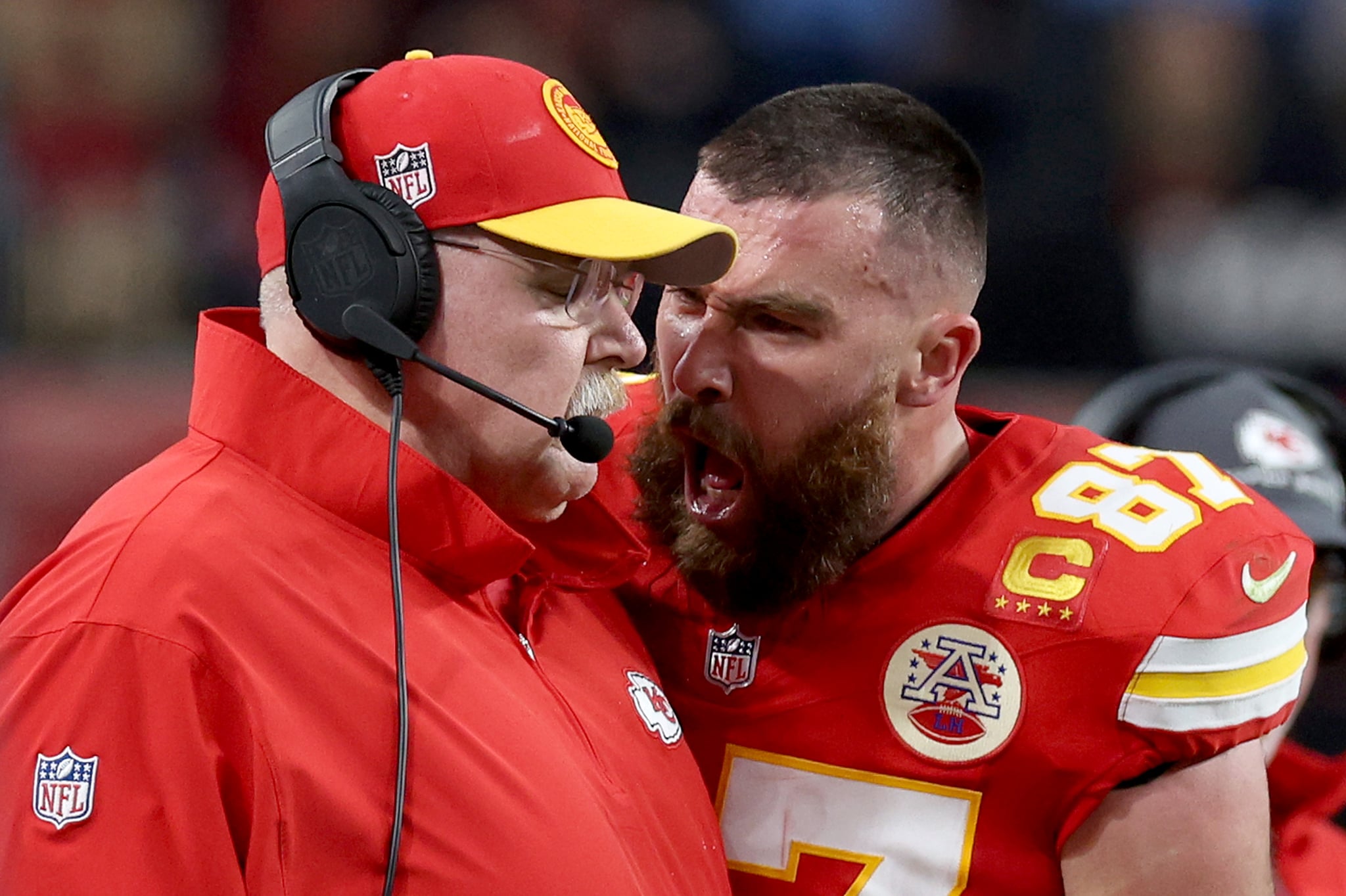Products You May Like
Usher’s iconic halftime show; star-studded TV commercials; Taylor Swift’s squad; sheer competitive spirit. There were many reasons to watch Super Bowl LVIII, in which the Kansas City Chiefs beat the San Francisco 49ers in Las Vegas. But perhaps not expected was an altercation between Chiefs tight end Travis Kelce and head coach Andy Reid. Deeply upset that Reid had taken him out of the game during the second quarter, Kelce shouted in the head coach’s face and hip-checked the 65-year-old so hard that Reid lost his balance. Red in the face and boiling with steam, Kelce was physically pulled away by teammate Jerick McKinnon.
The act caught the world off guard. Swifties, many of them newfound sports fans with great concern for Swift’s safety, took to X right away to question his actions. “This is a red flag Taylor. Huge red flag,” one X user captioned a video of the incident.
A lot of Black folks reacted to the video as well, claiming that the situation would look a lot different if a Black player did the same thing. As one user wrote: “Seriously though, if Lamar Jackson, Deebo Samuel, Brandon Aiyuk, Rashee Rice, etc etc did what Kelce did to Andy Reid they would’ve been called a thug and a menace and embarrassments to the NFL as a whole and there would be panels on the negative influences on our youth etc etc.”
This is Kelce’s third outburst that’s been widely televised. In another during a Christmas Day loss to the Las Vegas Raiders, the star threw his helmet in bottled-up aggression. And during training camp last year, Kelce punched then-teammate Jack Cochrane and went on to publicly apologize via X.
“Black people and women athletes don’t have the luxury of being hotheads.”
Many fans and Black viewers frustratedly noted that white privilege affords players like Kelce great latitude, and pointed out other examples of white men athletes getting passes when displaying physical aggression. In 1990, for example, tennis star Andre Agassi spit at his opponent’s foot and was labeled “rebel” and immediately signed a Canon contract post-game — proof that white men are accepted and even rewarded for showing their anger and passion during sports games.
Unfortunately, Black people and women athletes don’t have the luxury of being hotheads. Think back to the 2018 US Open final between Serena Williams and Naomi Osaka. Williams received three penalties from umpire Carlos Ramos, including for breaking her racket and calling Ramos a “thief.” “When a woman is emotional, she’s ‘hysterical’ and she’s penalized for it,” tennis legend Billie Jean King tweeted of the 2018 moment. “When a man does the same, he’s ‘outspoken’ and there are no repercussions.” White men athletes are celebrated for trash-talking or displaying love for the game, while women athletes are scorned for even expressing displeasure.
A more recent example happened last year at the NCAA championships, when LSU forward Angel Reese was harshly judged for poor character when she threw up John Cena’s famous “you can’t see me” gesture to Iowa Hawkeyes star Caitlin Clark. What should have been seen as a confident and lighthearted gesture toward Clark — who mimicked Cena mere days before — was gawked at as thug-like. “Classless piece of sh*t,” Barstool Sports founder David Portnoy said of Reese. “What a f*cking idiot,” white sports commentator Keith Olbermann echoed.
The fact of the matter is: Black women athletes are not afforded access to our emotions. We don’t have the same ability to get away with bad behavior. Instead, at the first sign of poor sportsmanship, we risk losing everything: our reputations, brand collaborations and new deals, respect, fans.
History tells me that Kelce will still be revered as one of the best modern-day footballers (and one of America’s biggest stars if his relationship with Swift continues) — and that this tantrum will be water under the bridge before the weekend hits. It was evident in his post-game interview with ESPN. He smugly smiled and joked, “Oh you guys caught that? . . . I was just telling him how much I love him.” Why? Because history has told him that he will be fine, that he’ll emerge unscathed from the consequences non-white and women athletes would face in his situation.
The public response toward Kelce’s outburst has also mostly reverted to the same, decades-long trope. Even Reid brushed it off
, joking that Kelce “keeps me young.” White athletes are celebrated, coddled even, while Black and women athletes are punished and scrutinized for behaving poorly. When is the change coming? When will all athletes be given the same grace to display passion? Simply put: I want the world to respect Black and women athletes. We should be acknowledged as full beings, capable of a wide range of emotions — frustration and anger included.
Image Source: Getty / Jamie Squire
